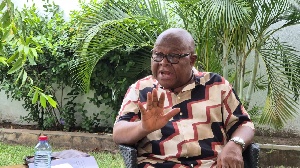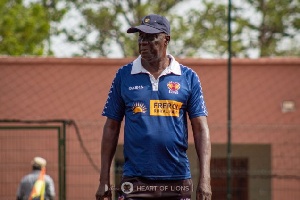- Home - News
- Elections 2024
- News Archive
- Crime & Punishment
- Politics
- Regional
- Editorial
- Health
- Ghanaians Abroad
- Tabloid
- Africa
- Religion
- Photo Archives
- Press Release
General News of Thursday, 8 May 2025
Source: www.ghanawebbers.com
Oquaye slams 'ridiculous' Chief Justice removal processes
Former Speaker of Parliament, Professor Aaron Mike Oquaye, has criticized Ghana’s 1992 Constitution. He specifically targets the section on removing the Chief Justice.
Oquaye believes the law is too weak and can be exploited by any president. His comments come after the suspension of a high-ranking official in Ghana. This suspension followed investigations into three petitions for her removal.
According to Article 146(10) of the Constitution, President Mahama suspended the Chief Justice. This was done on the advice of the Council of State and is pending an investigation by a five-member committee.
On May 8, during an interview on Joy News' The Pulse, Oquaye called for constitutional amendments. He questioned why this law has existed for so long without criticism.
He noted that he had previously raised concerns about this issue. His views were shared during a lecture at the University of Ghana's jubilee celebrations.
Oquaye expressed that if a president decides someone should go, they will be removed. He explained that decisions are made by majority vote within the committee.
If two Supreme Court judges agree while three civilians disagree, it results in a majority decision. There is no option for appeal after this decision is made.
The process begins when a petition for removal reaches the President. However, the Constitution does not specify who can submit this petition.
Once received, the President consults with the Council of State to form a committee. This committee includes two Supreme Court Justices and three non-lawyers from outside Parliament or Council of State.
The Constitution does not clarify who these three members should be either. All proceedings under Article 146 are held in secret.
The Chief Justice facing removal can defend themselves personally or through legal counsel. If referred to a committee, the President may suspend them based on advice from the Council of State.
After reviewing findings from the committee, the President must follow their recommendations. Importantly, there is no provision allowing a Chief Justice to appeal against adverse findings from this process.











